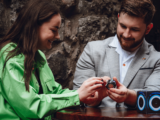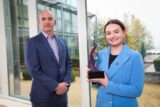Register for Galway Social Enterprise Event
Eibhlin’s Ehlers Danlos Syndrome meant that she couldn’t game the way she wanted, so they decided to make a solution that meant both she and Brandon could game on their own terms. Brandon’s engineering and business background, combined with Eibhlin’s game design expertise, meant it was a match made in tech heaven.
ByoWave’s Proteus Controller effectively gives anyone the power to build their own custom controller to suit distinctive needs. In fact, a single Proteus Controller kit allows for up to 100 million different configurations which says a lot about the detailed engineering and design work that has gone into crafting this exceptional product.
Today, Brandon is the CEO and Eibhlinn is the CXO, and they work closely with the team of 8 full time employees, the earliest of those joining was Ronan Murphy, an electronic engineer.
ByoWave is a fantastic example of a social enterprise because it is solving a problem that people with disabilities have when it comes to enjoying a seamless and personalised experience.
Brandon took time out to speak with us for this case study – and his thoughts on social enterprise really hammer home the point that its definition varies depending on whom you’re speaking to.
An enterprise whose main mission is centred around social progression for some marginalised group would be a good definition - and we do certainly fall into that category
Brandon explains, and he goes on to say that there is a distinction between a ‘start-up’ and a social enterprise.
In essence, social entrepreneurs are trying to create unmet needs or solve problems that others either haven’t been able to or have been blocked in doing so by bureaucracy.
In a way, ByoWave are in the middle of the Venn diagram between ‘traditional’ start-up and a social enterprise, so it’s interesting to hear what that has been like.
“We’re trying to overlap the two, and there are a lot of challenges with that, but there are also a lot of strategic, competitive advantages.
“With funding, some people might just decide that your business isn’t going to 10x – it might 2x or 3x, but I’d rather do something that’s going to 3x and have a social good than go full 10x with something that’s really boring and not really going to change anything.”
Straddling the boundaries between a start-up business to generate revenue while creating positive social change is a constant that Brandon is fully aware of, but as he says himself “if you get it right – which is what we’re trying to do – you can scale, everyone can make returns on it, and you can do something positive with it, and that’s been my goal since the very start.”

Brandon and Eibhlin were keen to do their research right to make sure they were solving the problem of inaccessible gaming controllers for those who need them more. So, they went out into the world and spoke directly with people who had been stopped by traditional barriers to enjoy gaming. So, what has it been like to see the impact ByoWave’s Proteus Controller has been having?
“In those moments, it feels incredible. You put aside any insecurities you have – business or personal – and you feel extremely fulfilled, like everything you’re doing makes sense,” Brandon explains.
But it takes time to achieve those moments. The entire team has put in untold hours – and much of the first year was spent building data and speaking with people to design the end product. Now, over two-and-a-half years in, they have a manufacturing plant in China and they are building out a network over there. With thousands of controllers to be made in the short term, this will allow ByoWave to build a much bigger data set of how well the Proteus Controller works.
“Whenever you’re at the forefront of something, whenever you’re in the innovation space, you never fully know if what you’re doing is the exact best way to do something. And in a way, it never will be. When we get all those units, I get to go back into engagement mode and I get to go to hundreds of people and see who it’s working for, who it’s not working for, what changes can be made, how we can make the group of people it does work for as big as possible. And that’s what will quell all my anxieties!” Brandon explains with a laugh.

Brandon’s point about constantly trying – and wanting – to reiterate so you can improve the product for your users is a fascinating one. More importantly, it speaks to his drive and determination to give those who need this solution what they need.
So, what would Brandon’s advice be to those who are interested in social enterprise and want to get involved in the space?
“From my own experience, it would just be – if you want it enough, take action immediately, but the product of that action might not become evident for years. I wanted to be a social entrepreneur since my first year in college, and it took a million minor experiments that I was doing every single day – talking to the right people, figuring out the right networks, gaining the right skillsets through engineering, innovation, marketing, and finance.
“You don’t have to be an expert in these areas, but start right now understanding these things. When you start building out the model of how these things work in your head – and you’re in a problem-solving mode while really listening to people, you’ll come across your opportunity through meeting someone like Eibhlin, your understanding of someone else’s problem where you can provide helpful input.”
ByoWave are a fantastic example of a social enterprise, and they are making phenomenal strides already. Having won numerous awards, attracted great investment, and created a physical working product, they are really pushing boundaries and breaking down barriers. Their end-game is to make gaming more accessible, help people to level up in their everyday lives, and create more accessible fun – and they’ve certainly completed that mission already.
